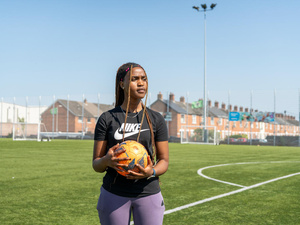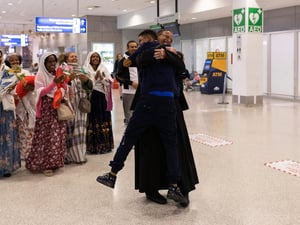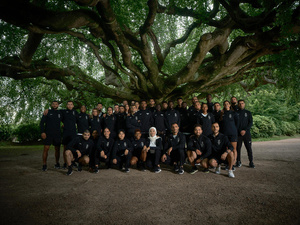From refugee to friend: hosting refugees a 'win-win' for some in UK
From refugee to friend: hosting refugees a 'win-win' for some in UK

Social worker Emily Reynolds and her boyfriend Gijs Van Amelsvoort are hosting Areej from Sudan. The three spend time together watching movies and sharing meals.
LONDON – Opening one’s home – and life – to someone who has been forced to flee their own country is not a decision to be taken lightly. But, as a new photographic exhibition on refugee-hosting in Britain demonstrates, it can bring real benefits to both parties.
Offering a room to a refugee can help them find their feet and better integrate in their new country, a process that can prove alienating and confusing. And for those wanting to do their part for the refugee crisis, it is a tangible, meaningful and potentially life-changing gesture. Often, bonds are forged that stand the test of time.
“The most lovely, surprising thing that happened is that we became friends,” Emily Reynolds, 28, said of her experience in London hosting “sassy” Areej, a refugee who fled Sudan needing international protection.
This and other personal stories are captured in Great British Welcome, the British chapter of No Stranger Place, an exhibition of photographs and stories portraying refugees and their hosts at home across Europe. The series was developed by the photographer Aubrey Wade in partnership with UNHCR, the UN Refugee Agency.
"The lives of both the hosts and the refugees are positively enriched by the experience of living with each other.”
Wade went to meet and photograph some of the British hosts, whose generosity of spirit is helping to transform the lives of those who have forced to flee, giving them the chance to start a new life in the UK.
“The enduring impression this project has left on me is the way in which the lives of both the hosts and the refugees are positively enriched by the experience of living with each other,” Wade said. “It really is win-win.”
The exhibition offers visitors a personal insight into hosts’ and refugees’ lives together.
One family, the Goldhills, have welcomed Faraj, 21, into their Cambridge home. He fled war-torn Aleppo in 2012.
“He comes from a very orthodox Islamic background and then he comes to a very Jewish family,” said Simon Goldhill, a professor of Greek literature at Kings College, Cambridge University. “He prays five times a day and then comes to synagogue with us and helps the rabbi. This is a testament to who Faraj is. He sees our differences, but never as an issue.”
Simon’s daughter Sarah, 27, said Faraj “completely lifts me up out of my mundane day and grumpiness.”
The collection helps show that even as the numbers displaced by war and persecution have surged, Europeans have shown compassion, hope and humanity by opening their homes to refugees, helping to bridge cultural divides and break down language barriers. The exhibition includes portraits from Germany, Sweden, France and Austria.
"Sometimes I think too much, get sad, and can’t sleep. But generally I am happy now."
In Britain, the project received invaluable support from Refugees at Home, a charity connecting those with a spare room in their home with asylum-seekers and refugees who badly need accommodation.
“There is a real sense of civic-mindedness and support for refugees at the grass roots level in Britain,” said Gonzalo Vargas Llosa, UNHCR’s UK Representative. “Refugees at Home, and the hosts it links to refugees, are testament to that.”
The exhibition also helps show that refugees are normal people with everyday issues.
One host, Catharine Elliott, has been hosting Hussein, 20, from Ethiopia, since October 2016, since her boys left home.
“The difference between London-born and Ethiopia-born teenage boys is minimal. Teenage boys the world over are the same. They don’t realize sheets need changing and that laundry doesn’t walk away on its own,” she said. “You just have to train them in the nicest way.”
Hussein’s journey to the UK was extremely difficult, but he has found a measure of stability.
“I often wake up scared because when I escaped through Libya they were shooting people in front of me,” he said. “It was too much. Sometimes I think too much, get sad, and can’t sleep. But generally I am happy now.”





